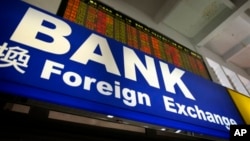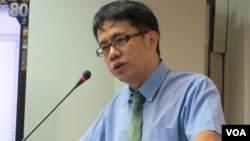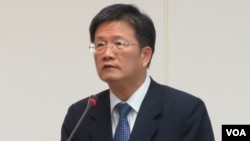TAIPEI —
Taiwan human rights groups say that opening up Taiwan to China’s financial organizations will weaken the safeguards on the personal information of Taiwanese citizens. But Taiwan authorities stress they will conduct rigorous controls.
Yan Jue-an, a member of Taiwan Democracy Watch, said after the cross-strait service agreement is signed, more Chinese financial institutions will come to Taiwan. But he says almost all of China’s banks are state-owned, and are probably tasked with political assignments.
“We can highly suspect it is equivalent to lifting the ban on the Communist Party’s political power, taking advantage of financial and economic channels to enter and intervene in Taiwan, influencing our democratic politics,” he said.
Yan Jue-an said that finance affects human rights and the finance industry’s improper system, as well as the people behind the scenes, pose a very serious encroachment on human rights. Yan suggested that the cross-strait service agreement should have a human rights clause.
Many Taiwan human rights groups expressed similar thoughts at a public hearing on Thursday, calling the opening of cross strait finance and telecommunications an “attack on democracy and human rights.”
Attack on National Security
Lai Zhong-qiang, the leader of the cross-strait agreement watch, said Taiwan’s Joint Credit Information Center (JCIC) has everyone’s credit information, which will be obtained by China’s Union Pay as well as the Bank of China through business requests. He alleged this access will attack Taiwan’s society and national security.
“China’s code of criminal procedures stipulates that those in charge of China’s banks cannot refuse to pass information to public security if requested. China’s banking customs are bumping against Taiwan’s poor JCIC, thus making the problem more serious,” he said.
Lai suggested Taiwan should put restrictions on Union Pay, allowing it to engage only in consulting services. Moreover, he said Taiwan’s banking laws must be amended to allow Chinese financial institutions to enter the JCIC only after personal information safeguards are complete.
Strict Controls
Wu Dang-jie, vice chairman of Taiwan’s financial supervisory commission, said Chinese banks have yet to become JCIC members. But he added that in the future, if they do apply, strict controls will be carried out.
“New members that inquire about information in the future must obtain consent from all interested parties; arbitrary inquires will not be allowed. In the future the JCIC will conduct investigations on new members’ inquires. If it violates rules, the inquiry must be stopped, and necessary disciplinary action must be taken,” he said.
Wu Dang-jie indicated the cross-strait service agreement promises to allow China Union Pay to establish branch offices in Taiwan, but the goal must be consulting services such as resolving financial problems for mainland tourists’, not allowing it to issue cards in Taiwan.
Defending Mechanism Insufficient
Qiu Wen-cong, vice president of the Taiwan association for human rights, believes that the Taiwan government’s planned defense mechanism is insufficient to face national security and economic security challenges.
Qiu Wen-cong pointed out that Chinese banks have branches in Taiwan. Even if they are not JCIC members, they have their own customers’ information. Besides, Taiwan’s laws are unable to regulate these banks’ mother-companies in China.
Han Shi-xian, secretary of the Taiwan financial industry’s labor union, said that on the cross-strait service agreement it seems China gave Taiwan more benefits, but according to his observation, the goal of mainland capital coming to Taiwan is not to make money; it is out of political considerations, to the point that it can disturb Taiwan’s financial order.
To protect the personal information of the Taiwan people, Han recommended the government initiate restrictions, controls and supervisory measures actively, rather than responding passively.
This article originally appeared on VOA Mandarin.
Yan Jue-an, a member of Taiwan Democracy Watch, said after the cross-strait service agreement is signed, more Chinese financial institutions will come to Taiwan. But he says almost all of China’s banks are state-owned, and are probably tasked with political assignments.
“We can highly suspect it is equivalent to lifting the ban on the Communist Party’s political power, taking advantage of financial and economic channels to enter and intervene in Taiwan, influencing our democratic politics,” he said.
Yan Jue-an said that finance affects human rights and the finance industry’s improper system, as well as the people behind the scenes, pose a very serious encroachment on human rights. Yan suggested that the cross-strait service agreement should have a human rights clause.
Many Taiwan human rights groups expressed similar thoughts at a public hearing on Thursday, calling the opening of cross strait finance and telecommunications an “attack on democracy and human rights.”
Attack on National Security
Lai Zhong-qiang, the leader of the cross-strait agreement watch, said Taiwan’s Joint Credit Information Center (JCIC) has everyone’s credit information, which will be obtained by China’s Union Pay as well as the Bank of China through business requests. He alleged this access will attack Taiwan’s society and national security.
“China’s code of criminal procedures stipulates that those in charge of China’s banks cannot refuse to pass information to public security if requested. China’s banking customs are bumping against Taiwan’s poor JCIC, thus making the problem more serious,” he said.
Lai suggested Taiwan should put restrictions on Union Pay, allowing it to engage only in consulting services. Moreover, he said Taiwan’s banking laws must be amended to allow Chinese financial institutions to enter the JCIC only after personal information safeguards are complete.
Strict Controls
Wu Dang-jie, vice chairman of Taiwan’s financial supervisory commission, said Chinese banks have yet to become JCIC members. But he added that in the future, if they do apply, strict controls will be carried out.
“New members that inquire about information in the future must obtain consent from all interested parties; arbitrary inquires will not be allowed. In the future the JCIC will conduct investigations on new members’ inquires. If it violates rules, the inquiry must be stopped, and necessary disciplinary action must be taken,” he said.
Wu Dang-jie indicated the cross-strait service agreement promises to allow China Union Pay to establish branch offices in Taiwan, but the goal must be consulting services such as resolving financial problems for mainland tourists’, not allowing it to issue cards in Taiwan.
Defending Mechanism Insufficient
Qiu Wen-cong, vice president of the Taiwan association for human rights, believes that the Taiwan government’s planned defense mechanism is insufficient to face national security and economic security challenges.
Qiu Wen-cong pointed out that Chinese banks have branches in Taiwan. Even if they are not JCIC members, they have their own customers’ information. Besides, Taiwan’s laws are unable to regulate these banks’ mother-companies in China.
Han Shi-xian, secretary of the Taiwan financial industry’s labor union, said that on the cross-strait service agreement it seems China gave Taiwan more benefits, but according to his observation, the goal of mainland capital coming to Taiwan is not to make money; it is out of political considerations, to the point that it can disturb Taiwan’s financial order.
To protect the personal information of the Taiwan people, Han recommended the government initiate restrictions, controls and supervisory measures actively, rather than responding passively.
This article originally appeared on VOA Mandarin.








